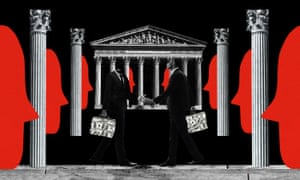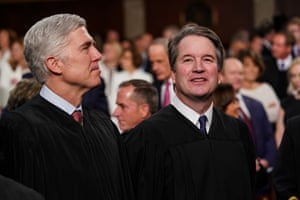The fight to vote
US elections 2020
Revealed: conservative group fighting to restrict voting tied to powerful dark money network
Honest Elections Project, part of network that pushed supreme court pick Brett Kavanaugh, is now focusing on voting restrictions
- Read our full coverage of US voting rights

Illustration: Franziska Barczyk
This story was reported in collaboration with OpenSecrets.
A powerful new conservative organization fighting to restrict voting in the 2020 presidential election is really just a rebranded group that is part of a dark money network already helping Donald Trump’s unprecedented effort to remake the US federal judiciary, the Guardian and OpenSecrets reveal.
The organization, which calls itself the Honest Elections Project, seemed to emerge out of nowhere a few months ago and started stoking fears about voter fraud. Backed by a dark money group funded by rightwing stalwarts like the Koch brothers and Betsy DeVos’ family, the Honest Elections Project is part of the network that pushed the US supreme court picks Brett Kavanaugh and Neil Gorsuch, and is quickly becoming a juggernaut in the escalating fight over voting rights.
The project announced it was spending $250,000 in advertisements in April, warning against voting by mail and accusing Democrats of cheating. It facilitated letters to election officials in Colorado, Florida and Michigan, using misleading data to accuse jurisdictions of having bloated voter rolls and threatening legal action.
Calling voter suppression a “myth”, it has also been extremely active in the courts, filing briefs in favor of voting restrictions in Nevada, Virginia, Texas, Wisconsin and Minnesota, among other places, at times represented by lawyers from the same firm that represents Trump. By having a hand in both voting litigation and the judges on the federal bench, this network could create a system where conservative donors have an avenue to both oppose voting rights and appoint judges to back that effort.
Despite appearing to be a free-standing new operation, the Honest Elections Project is just a legal alias for the Judicial Education Project, a well-financed nonprofit connected to a powerful network of dark money conservative groups, according to business records reviewed by the Guardian and OpenSecrets.
“These are really well-funded groups that in the context of judicial nominations have been systematically, over the long term but also the short term, kind of pushing an agenda to pack the courts with pretty extreme right wing nominees,” said Vanita Gupta, the president and CEO of the Leadership Conference on Civil and Human Rights. “The infrastructure that they’ve built over the years has been a really important vehicle for them to do this.”
For nearly a decade, the organization has been almost entirely funded by DonorsTrust, known as a “dark money ATM” backed by the Koch network and other prominent conservative donors, according to data tracked by OpenSecrets. In 2018, more than 99% of the Judicial Education Project’s funding came from a single $7.8m donation from DonorsTrust.
The Judicial Education Project is also closely linked to Leonard Leo, one of the most powerful people in Washington who has shaped Donald Trump’s unprecedented effort to remake the federal judiciary with conservative judges.
The organization has deftly hidden the changes to its name from public view. In December, the Judicial Education Project formally changed its legal name to The 85 Fund, a group Leo backed to funnel “tens of millions” of dollars into conservative causes, according to Axios. The Honest Elections Project is merely a fictitious name – an alias – the fund legally adopted in February. The change was nearly indiscernible because The 85 Fund registered two other legal aliases on the same day, including the Judicial Education Project, its old name. The legal maneuver allows it to operate under four different names with little public disclosure that it is the same group.
The Judicial Education Project is closely aligned with the Judicial Crisis Network, a group with unmatched influence in recent years in shaping the federal judiciary. The Judicial Crisis Network spearheaded the campaigns to get Gorsuch and Kavanaugh confirmed to the US supreme court, spending millions of dollars in each instance. It has also spent significantly on critical state supreme court races across the country.
There is a lot of overlap between the Honest Elections Project and the Judicial Crisis Network. Both groups share personnel, including Carrie Severino, the influential president of the Judicial Crisis Network. Both groups have been funded by The Wellspring Committee, a group Leo raised money for until it shut down in 2018. Both have also paid money to BH Group, an LLC Leo once disclosed as his employer, that made a $1m mystery donation to Trump’s inauguration.

“This is a small community that is really trying to push forward these more suppressive tactics that will be challenged in court and having those judges on the bench, they’re really hoping it’s going to continue to rig the system in their favor,” said Lena Zwarensteyn, who closely follows judicial nominations at the Leadership Conference. “By changing the rules of the game and who the referees are, they’re trying to change the landscape.”
Neither the Honest Elections Project nor the Judicial Crisis Network responded to requests for an interview.
The Honest Elections Project has become active as Republicans are scaling up their efforts to fight to keep voting restrictions in place ahead of the election. The Republican National Committee will spend at least $20m on litigation over voting rights and wants to recruit up to 50,000 people to help monitor the polls and other election activities.
Gupta said seeing a group that has been extremely successful in pushing judicial confirmations turn its attention to voting rights was alarming.
“It isn’t any surprise to those of us that do work in both of these spaces that our opponents [who] want to constrict access to voting, access to the courts, who are seeking an anti-inclusive, anti-civil rights agenda are one in the same,” she said.




